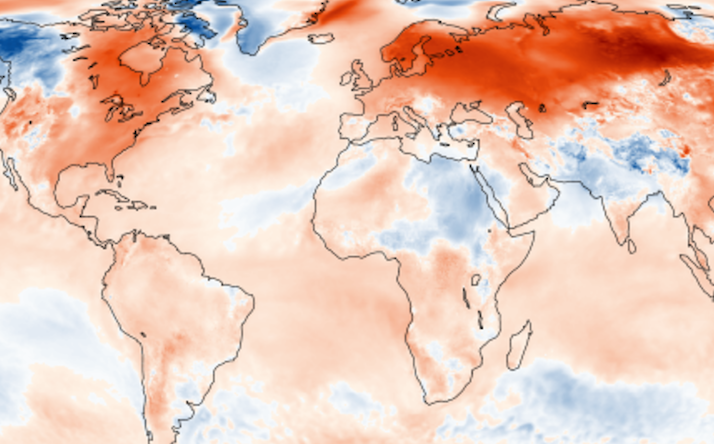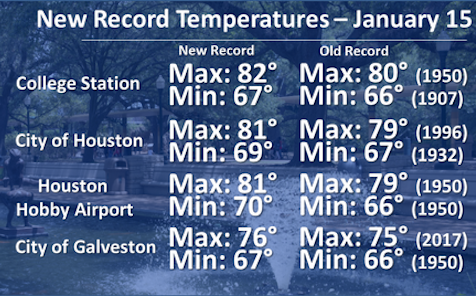Coming on the heels of Earth’s warmest year on record, 2020 started with the planet’s warmest January on record. In Texas, dozens of daily maximum readings exceeded or tied previous records.

Shades of red show average surface air temperatures in January 2020 compared to the 1981-2010 average. Source: Copernicus
It was an exceptionally warm January around the world, and Texas was no exception.
The global average temperature made 2020’s first month the planet’s warmest January on record, according to Copernicus, the European Union’s Earth observations agency. It was Europe’s warmest January on record, Copernicus said, and the fifth-warmest in the contiguous United States, the National Oceanic and Atmospheric Administration (NOAA) said.
In Texas, dozens of daily-high records for January were broken or tied at dozens of far-flung weather stations.
An analysis by Texas Climate News of temperature readings in a federal database showed that 52 new daily-high records were set and 44 were tied at 80 stations in the state.

Detail of a tweet by the National Weather Service’s Houston office
The National Weather Service drew attention to one example of Texas’ January warmth with a tweet: Record daytime high temperatures and record-high overnight minimums were recorded at all four of the agency’s Houston-region stations on January 15 – Houston, Houston’s Hobby Airport, Galveston and College Station.
“So far, [Texas’] winter – December-February – is averaging 3 to 5 degrees Fahrenheit above normal, putting it among the warmest 10 percent or 20 percent of winters just about everywhere in Texas,” the Texas state climatologist, John Nielsen-Gammon, told TCN.
“The rest of this week will be cool, but temperatures will warm up again by the weekend, so a warmer than normal winter overall looks secure,” he added.
This year’s warm start comes as scientists have been stepping up their warnings about the threats of climate change.
Last year, leading scientists warned that the damaging impacts of man-made global warming are accelerating as progress in slashing planet-warming pollution lags. Last month, U.S. agencies announced that 2019 was Earth’s hottest year on record and 2010-19 the hottest decade.
Also in January, a new study by climate scientists in Switzerland said they had detected for the first time a statistical “fingerprint” of climate change on a single day of global weather.
“For generations,” they wrote in the journal Nature Climate Change, “scientists have educated the public that ‘weather is not climate,’ and climate change has been framed as the change in the distribution of weather that slowly emerges from large variability over decades. However, weather when considered globally is now in uncharted territory.”
+++
We excluded January 2020 readings at the Fort Worth Naval Air Station from our analysis. John Nielsen-Gammon, the Texas state climatologist, said daily maximum temperatures reported for that location have exceeded readings at a nearby National Weather Station office by 15-20 degrees since mid-November 2019 and are clearly erroneous.
Nielsen-Gammon is a member of TCN’s volunteer Advisory Board, serving solely in his capacity as regents professor of atmospheric sciences at Texas A&M University.
+++++
Bill Dawson is the founding editor of Texas Climate News
